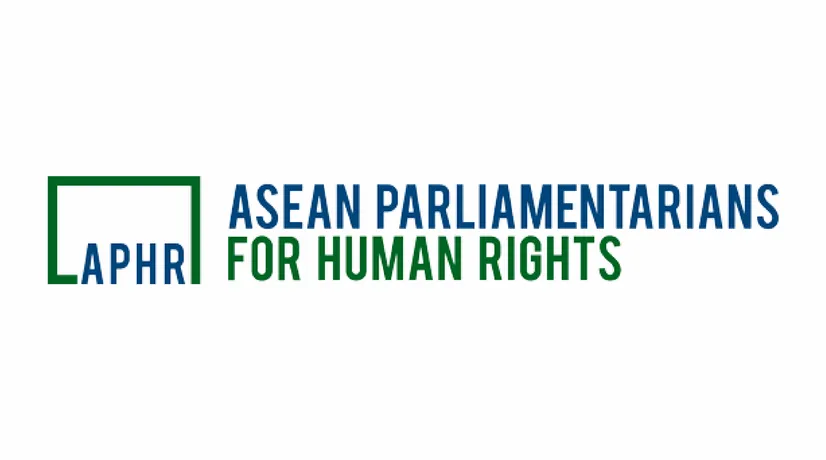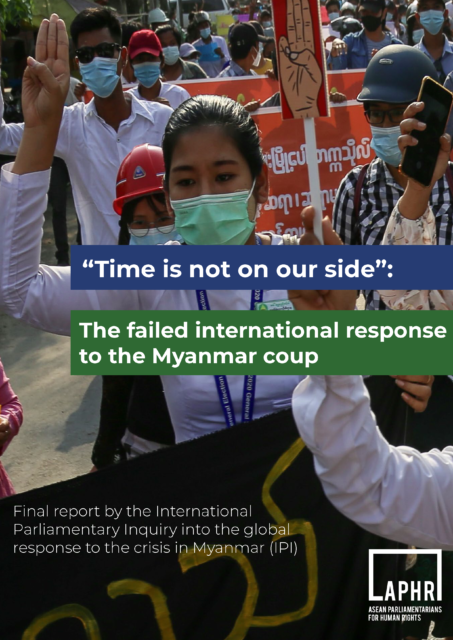“Time is not on our side”: The failed international response to the Myanmar coup
03 November 2022

 Executive Summary
Executive Summary
Since the Myanmar military staged a coup on 1 February 2021, the situation in the country has steadily deteriorated. The military junta, led by Senior General Min Aung Hlaing, has waged a brutal war of attrition against its own people, committing countless atrocities and ruining the country’s economy. Military forces have killed at least 2,371 people and displaced hundreds of thousands, bringing the total number of internally displaced persons in the country to over 1.3 million. The junta has also jailed more than 15,000 political prisoners and made routine use of torture against those arrested, all while launching a far-reaching crackdown on freedoms of expression and association, including an intense repression of independent media and civil society.
Nevertheless, the people of Myanmar have resisted. The massive peaceful demonstrations in the coup’s immediate aftermath, as well as the Civil Disobedience Movement (CDM) that saw hundreds of thousands join a general strike, including throughout the bureaucracy, demonstrated the population’s overwhelming rejection of a return to military rule. The coup has also inspired an unprecedented level of unity among those opposed to the military, including across ethnic lines.
In April 2021, the National Unity Government (NUG) of Myanmar was formed, bringing together parliamentarians ousted in the coup, ethnic minority representatives and civil society actors. The NUG rightly claims a mandate as the legitimate representative of the Myanmar people. It enjoys widespread popular legitimacy and support, especially in the country’s heartland, and represents the most inclusive government in Myanmar’s history. The NUG has expressed a commitment to establishing a new constitution and a genuine federal democracy in Myanmar, which would represent a major step toward fulfilling the aspirations for autonomy of the country’s ethnic minorities.
The junta’s attempts to subdue the resistance with extreme violence failed dramatically, and only served to exacerbate existing tensions and drive some anti-junta activists to turn to armed struggle to defend themselves. Anti-military militia groups known as people’s defense forces (PDFs)—some under the command of the NUG—have been established across the country, including in areas that had been relatively peaceful before. The coup has also triggered a new wave of violence between the military and ethnic armed organizations (EAOs), which have been fighting for autonomy for decades in the country’s borderlands. Some of these EAOs, such as the armed wings of the Karen National Union (KNU) and the Kachin Independence Organization (KIO), have allied themselves with the NUG. Not all EAOs have formally joined the anti-military struggle, as Myanmar’s political landscape remains extremely complex and fractured.
The escalating violence has precipitated the near collapse of the economy and an unprecedented humanitarian crisis. Myanmar’s GDP has dropped 13 percent since 2019, and 40 percent of the country’s population now lives below the national poverty line. Despite the increased needs, humanitarian actors have struggled to reach vulnerable and remote populations, as the military has placed severe limitations on humanitarian access.
The international community has proven largely unable to respond effectively to the crisis. The junta’s international allies—most prominently Russia and China—have emerged as steadfast and uncritical supporters, supplying both weapons and legitimacy to an otherwise isolated regime. Foreign governments that profess support for democracy have not backed up their rhetoric with the same force of action, however. While a number of countries have imposed sanctions targeting junta leaders and their personal assets, these efforts remain uncoordinated and have failed to successfully target key revenue-generating entities, such as the Myanmar Oil and Gas Enterprise (MOGE). The United Nations has been particularly hampered by internal divisions and has proved to be unable to project influence. The NUG has attracted supporters globally and continues to occupy Myanmar’s seat at the UN, but most governments have been hesitant to formally recognize it, despite calls from parliaments and advocates to do so.
The Association of Southeast Asian Nations (ASEAN), of which Myanmar is a member, has been similarly plagued by internal divisions and unable to respond effectively. The bloc’s “Five-Point Consensus,” signed in April 2021 and aimed at addressing the crisis, has utterly failed, hampered by a lack of will on the part of all ASEAN member-states to enforce it, and a military leadership in Myanmar that did not show any intention of implementing it from the beginning. While some member-states, such as Malaysia, have called for a new approach, including direct engagement with the NUG and other pro-democracy forces, others, including Thailand or Cambodia, have persisted as junta enablers.
As Myanmar slides into civil war, the possibility for a negotiated solution to the conflict has all but closed completely. The dialogue prescribed in ASEAN’s Five-Point Consensus is impossible under the current conditions. Responsibility lies with the junta, which has shown no willingness to engage with those who oppose it and has instead relied exclusively on brute force in its attempt to stamp out any opposition. The execution of four political prisoners in July 2022, the country’s first judicial execution since 1988, highlighted both the military’s brutality and its complete disinterest in negotiations. The coup brought the previous power-sharing arrangement with the civilian leadership to an unceremonious end. Now the vast majority of the Myanmar people have expressed a clear desire not to return to the status quo ante.
Nineteen months after the coup, the military junta has been unable to consolidate its power. Wide swaths of Myanmar’s territory are contested between the military and forces associated with the NUG or EAOs, and it can be stated that the coup has failed. In areas along the Thai border, EAOs like the KNU and the Karenni National Progressive Party (KNPP) are working together, providing basic services to the population, and showing what a future Myanmar, in which different groups cooperate rather than fight amongst themselves, could look like if the country is able to shake off the tyranny of the military.
As Myanmar’s future hangs in the balance, external pressure on the military and support for the resistance may well be the deciding factor in the course of the conflict. The international community can, and should, do more to help the Myanmar people to send the military to the barracks and establish a federal democracy. It should start with substantially increasing its efforts to address the worsening humanitarian crisis, intensifying its pressure on the illegal junta through coordinated sanctions and arms embargoes, and recognizing the NUG as the legitimate authority in Myanmar. The NUG, as well as aligned EAOs, should be provided with funding and capacity building programmes on governance and federalism. But action should be taken urgently. As Khin Ohmar, Myanmar activist and Chair of Progressive Voice said during one of the IPI oral hearings, “time is not our side”.
Click here to read the report’s Executive Summary and Recommendations in Burmese.
Click here to read the report’s Executive Summary and Recommendations in Indonesian.
Click here to read the report’s Executive Summary and Recommendations in Malay.
Click here to read the report’s Executive Summary and Recommendations in Thai.
Announcements
21 May 2025
Open letter: Malaysia must lead ASEAN with principle, not hypocrisy, to address the Myanmar crisis

Progressive Voice is a participatory rights-based policy research and advocacy organization rooted in civil society, that maintains strong networks and relationships with grassroots organizations and community-based organizations throughout Myanmar. It acts as a bridge to the international community and international policymakers by amplifying voices from the ground, and advocating for a rights-based policy narrative.